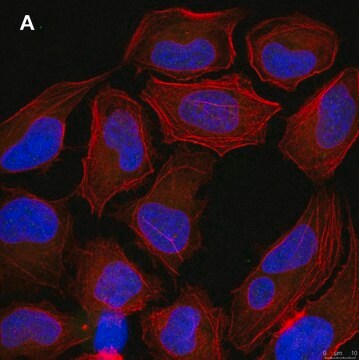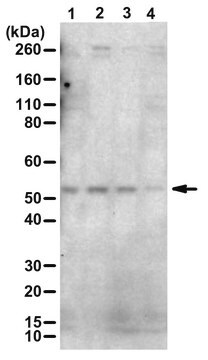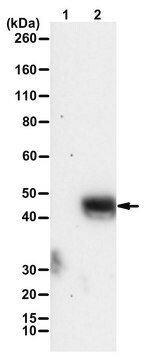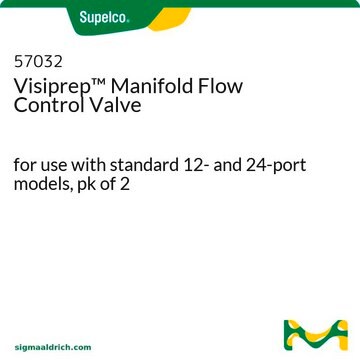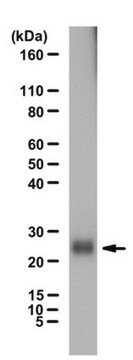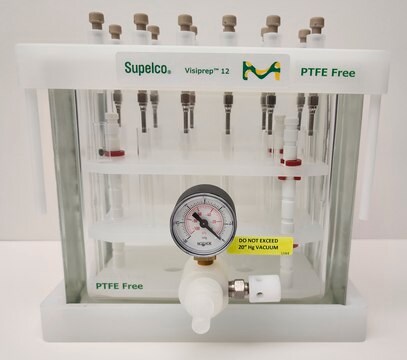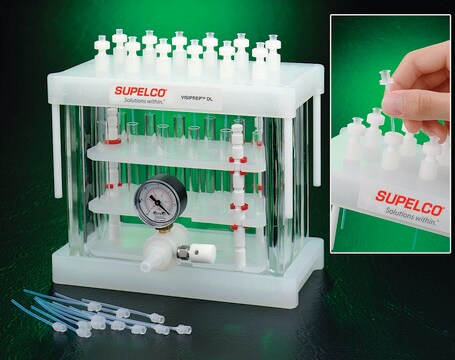추천 제품
생물학적 소스
rabbit
Quality Level
결합
unconjugated
항체 형태
purified antibody
항체 생산 유형
primary antibodies
클론
polyclonal
분자량
observed mol wt ~28 kDa
정제법
affinity chromatography
종 반응성
human
종 반응성(상동성에 의해 예측)
mouse, chimpanzee, hamster, rat
포장
antibody small pack of 100 μg
기술
affinity binding assay: suitable
western blot: suitable
동형
IgG
에피토프 서열
N-terminal half
단백질 ID 수납 번호
UniProt 수납 번호
배송 상태
2-8°C
타겟 번역 후 변형
phosphorylation (pSer67)
유전자 정보
human ... UBB(7314)
일반 설명
Ubiquitin (Ub) is initially produced as a 229 amino acids Polyubiquitin-B (UniProt: P0CG47) precursor protein encoded by the UBB gene (Gene ID: 7314) or a 685 amino acids Polyubiquitin-C precursor protein (UniProt: P0CG48) encoded by the UBC gene (Gene ID: 7316) in human. Ub exists either covalently attached to another protein, or free (unanchored). When covalently bound, it is conjugated to target proteins via an isopeptide bond either as a monomer (monoubiquitin), a polymer linked via different Lys residues of the ubiquitin (polyubiquitin chains) or a linear polymer linked via the initiator Met of the ubiquitin (linear polyubiquitin chains). Ub is linked covalently via its carboxyl terminus (Gly76) to usually Lys residues in target proteins. In a given target Lys residue can be linked to one single Ub molecule (monoubiquitylated) or to a chain of Ub molecules (polyubiquitylated). In a polyUb chain, Ub molecules can be linked through one of the seven Lys residues (K6, K11, K27, K29, K33, K48, and K63) or through the Ub N-terminus Met1 residue (which generates linear chains). Polyubiquitin chains, when attached to a target protein, have different functions depending on the Lys residue of the ubiquitin that is linked. For example, lysine 6-linked may be involved in DNA repair; lysine 11-linked is involved in endoplasmic reticulum-associated degradation (ERAD) and in cell-cycle regulation, and lysine 29-linked is involved in lysosomal degradation. Lysine 48-linked chains mark proteins for proteasomal degradation, while lysine 63-linked chains are involved in endocytosis, DNA-damage responses, and in signaling leading to activation of the transcription factor NF-kappa-B. Ubiquitin undergoes phosphorylation at the serine 57 by a ubiquitin kinase and this phosphorylation is an important modifier of ubiquitin function, particularly in response to proteotoxic stress. This phosphorylation may also be a deciding factor whether ubiquitin is recycled or degraded during multi-vesicular body sorting on endosomes. (Ref.: Hepowit, NL., et al (2020). eLife 9; e58155; Lee, S., et al. (2017) eLife. 6; e29176).
특이성
This rabbit polyclonal antibody specifically detects Ubiquitin phosphorylated on serine 57.
면역원
KLH-conjugated linear peptide corresponding to 10 amino acids surrounding phosphoserine 57 of human Ubiquitin.
애플리케이션
Quality Control Testing
Evaluated by Western Blotting with a construct containing GST-tagged recombinant fragment of Ubiquitin phosphorylated on serine 57.
Western Blotting Analysis (WB): A 1:1,000 dilution of this antibody detected a construct containing GST-tagged recombinant Ubiquitin phosphorylated on serine 57, but did not react with non-phosphorylated construct. (Phospho-Ubiquitin construct: Courtesy of Dr. Jesse Rinehart, Yale University, School of Medicine).
Tested Applications
Affinity Binding Assay: A representative lot of this antibody bound phospho-Ubiquitin (ser57) peptide with a KD of 1.0 x 10-12 in an affinity binding assay.
Note: Actual optimal working dilutions must be determined by end user as specimens, and experimental conditions may vary with the end user
Evaluated by Western Blotting with a construct containing GST-tagged recombinant fragment of Ubiquitin phosphorylated on serine 57.
Western Blotting Analysis (WB): A 1:1,000 dilution of this antibody detected a construct containing GST-tagged recombinant Ubiquitin phosphorylated on serine 57, but did not react with non-phosphorylated construct. (Phospho-Ubiquitin construct: Courtesy of Dr. Jesse Rinehart, Yale University, School of Medicine).
Tested Applications
Affinity Binding Assay: A representative lot of this antibody bound phospho-Ubiquitin (ser57) peptide with a KD of 1.0 x 10-12 in an affinity binding assay.
Note: Actual optimal working dilutions must be determined by end user as specimens, and experimental conditions may vary with the end user
Anti-phospho-Ubiquitin (Ser57), Cat. No. ABS2206, is a rabbit polyclonal antibody that detects phospho-Ubiquitin (Ser57) and is tested for use in Affinity Binding Assay and Western Blotting.
물리적 형태
Purified rabbit polyclonal antibody in buffer containing 0.1 M Tris-Glycine (pH 7.4), 150 mM NaCl with 0.05% sodium azide.
저장 및 안정성
Recommend storage at +2°C to +8°C. For long term storage antibodies can be kept at -20°C. Avoid repeated freeze-thaws.
기타 정보
Concentration: Please refer to the Certificate of Analysis for the lot-specific concentration.
면책조항
Unless otherwise stated in our catalog or other company documentation accompanying the product(s), our products are intended for research use only and are not to be used for any other purpose, which includes but is not limited to, unauthorized commercial uses, in vitro diagnostic uses, ex vivo or in vivo therapeutic uses or any type of consumption or application to humans or animals.
적합한 제품을 찾을 수 없으신가요?
당사의 제품 선택기 도구.을(를) 시도해 보세요.
Storage Class Code
12 - Non Combustible Liquids
WGK
WGK 1
시험 성적서(COA)
제품의 로트/배치 번호를 입력하여 시험 성적서(COA)을 검색하십시오. 로트 및 배치 번호는 제품 라벨에 있는 ‘로트’ 또는 ‘배치’라는 용어 뒤에서 찾을 수 있습니다.
자사의 과학자팀은 생명 과학, 재료 과학, 화학 합성, 크로마토그래피, 분석 및 기타 많은 영역을 포함한 모든 과학 분야에 경험이 있습니다..
고객지원팀으로 연락바랍니다.